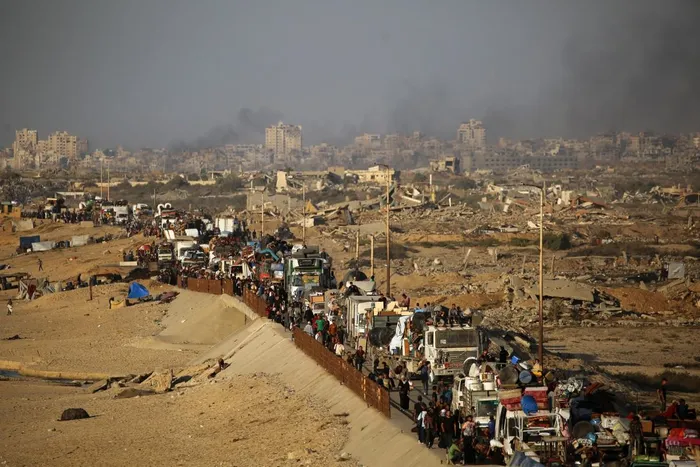
Thousands of hostages are expected to be released within 72 hours of the ceasefire agreement as the Israel army remains in Gaza.
Image: Eyad Baba / AFP
Despite the long-awaited ceasefire in Gaza, South Africans standing in solidarity with Palestine say a fragile truce cannot erase the scars of months of bombardment, displacement, and loss.
For many, the relief of silence after relentless airstrikes is overshadowed by grief, anger, and the urgent demand for accountability.
The ceasefire, which followed mounting international pressure and global protests, brought hope to a world weary of war headlines and death tolls.
Across the country, voices of conscience are insisting that justice, accountability, and recognition of Palestinian rights must form the foundation of any lasting solution.
Dr Fatima Hendricks, a South African humanitarian volunteer recently released after being detained by Israeli forces, provided a harrowing account of her ordeal.
Hendricks described how the boat she was travelling on, carrying humanitarian aid, was intercepted in international waters.
She explained that she was forcibly taken, stripped of legal and consular access, and held under degrading conditions.
“We were deprived of food, water, and access to basic facilities for over 24 hours. My hijab was denied, I was mocked, my dignity stripped,” Hendricks said, recounting how detainees were subjected to humiliating treatment and physical intimidation.
Her experience, she said, was a glimpse of the suffering endured by countless Palestinians under siege.
“This is not just about us. This is about bearing witness to the brutality inflicted upon the Palestinian people,” she added.
Academic perspectives highlight the structural dimensions of the conflict.
Professor Heidi Grunebaum, acting director at the Centre for Humanities Research at the University of Western Cape (UWC) described the Gaza situation as an “asymmetric conflict” comparable to the colonial and apartheid-era struggles in South Africa.
She emphasized that ceasefires, while critical to halt immediate bloodshed, do not address the deep-seated domination and dispossession that Palestinians endure.
“The decades-long occupation, the ongoing Nakba, and structural apartheid define Palestinian life. Any political solution must centre Palestinian voices and mandates, ensuring they lead negotiations with Israel,” Grunebaum said.
She warned that international agreements must be scrutinised rigorously, citing past ceasefires that were broken by Israel, leaving Palestinians to face renewed waves of violence.
Grunebaum emphasised that meaningful resolution requires the central participation of Palestinians.
“It cannot be done without a political process in which Palestinians' voices are at the heart of such an engagement with Israel,” Grunebaum said.
Ayesha Bagus, speaking on behalf of Mothers4Gaza, reiterated that a ceasefire without justice is merely a pause in genocide.
“Peace that is not rooted in justice is silence in the face of oppression. The root causes, occupation, displacement, apartheid policies, remain. Until Palestinians are free to determine their own political destiny, ceasefires are temporary and hollow,” she said.
Bagus called for full liberation, stressing that Palestinians must have control over their reconstruction, economy, and governance.
She further emphasised the global responsibility to pressure Israel and its allies to comply with international law and to halt ongoing violations of human rights.
The Palestine Solidarity Campaign coordinator, Professor Yusuf Chikte, underlined the insufficiency of a ceasefire without structural change.
“The word ‘ceasefire’ sounds hollow. We’ve heard it before…A ceasefire without justice is just a pause in genocide. The bombs may stop for a while, but the siege, starvation, collective punishment, and occupation continue.”
Chikte also stressed the importance of enforcement and accountability.
“We have learned that without enforcement, international law is just a paper exercise. Gaza is where those promises are tested.” He warned that recovery in Gaza will take generations.
“The recovery will take generations. The trauma is total: children who cannot sleep, parents who have buried entire families… Economic recovery will require full reconstruction under Palestinian control… True healing must come with freedom, not dependency.”
He added that Israeli political and military leaders must face prosecution for war crimes and genocide. “Equally, states and corporations aiding and abetting these crimes bear responsibility. Gaza is where the world tests its own commitments to international law,” he said.
South African activists emphasise that humanitarian relief, while urgent, is insufficient to address the long-term political and social consequences.
True recovery, they argue, must involve both material reconstruction and the restoration of dignity, autonomy, and self-determination.
South African solidarity groups are now calling for decisive action, including sanctions, arms embargoes, and the prosecution of those complicit in facilitating the atrocities.
As Bagus explained: “No plan, no truce, no reconstruction effort can substitute for full liberation. Justice requires ending apartheid, dismantling occupation, and restoring Palestinian rights.”
Hendricks, Bagus, and Chikte all underscore that the Palestinian people must remain central to any process of negotiation, recovery, or state-building.
As the world watches Gaza, South Africans reaffirm that the fight for justice transcends borders. “We cannot stand silent,” said Bagus.
“Peace without justice is a betrayal. Our role is to stand beside Palestinians, not speak over them. Liberation is their right, and our duty is solidarity.”
mandilakhe.tshwete@inl.co.za